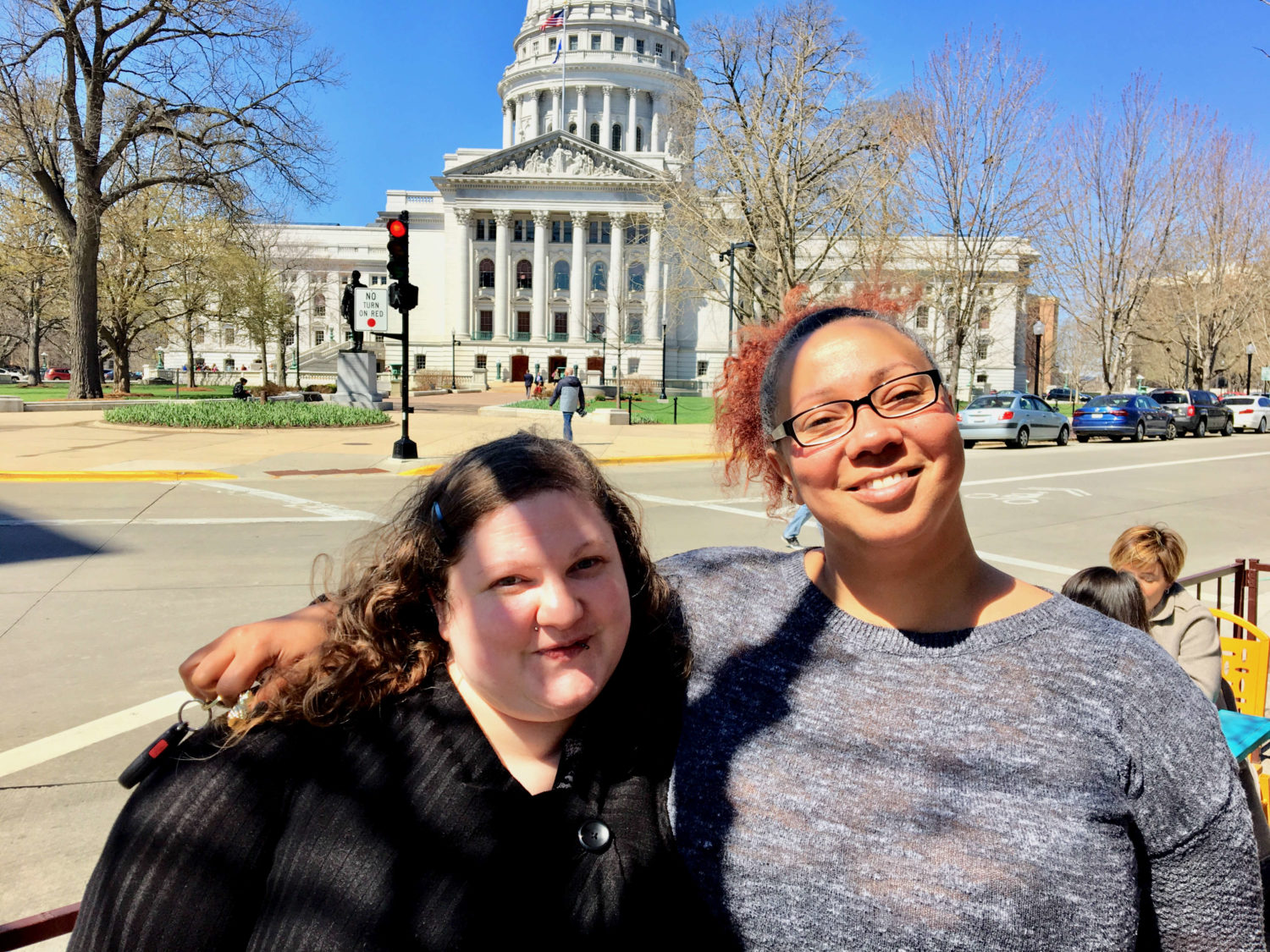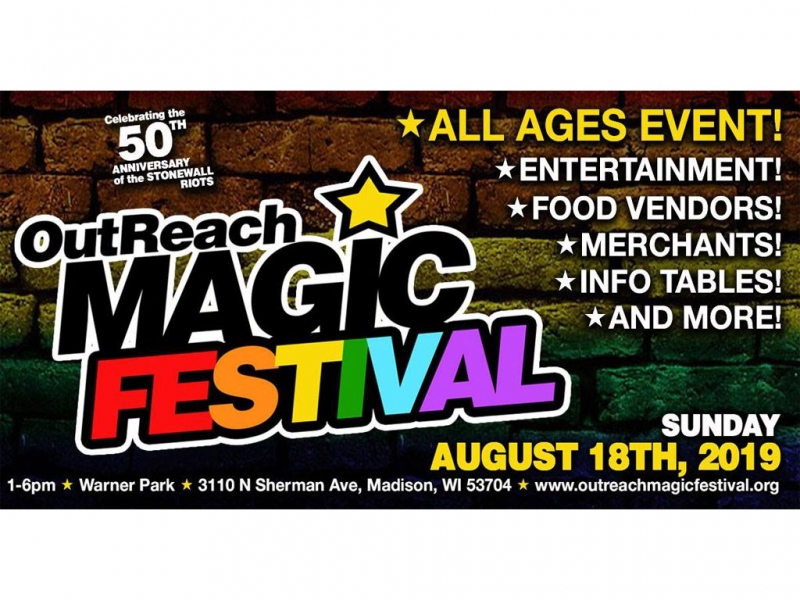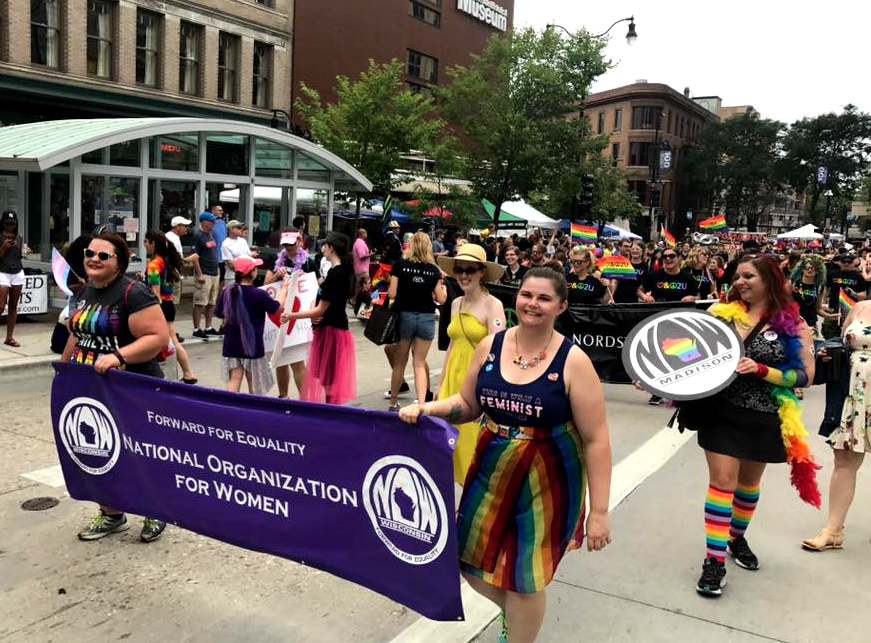
There was quite a bit of outrage last year when OutReach LGBT Community Center revoked invites to law enforcement groups to march in their annual Pride Parade after resistance from members of the community, particularly people of color, who said that they felt unsafe with officers participating armed and in uniform.
There was more anger a month and a half ago when OutReach announced that they would be not to be hosting their popular annual Pride Parade this year in downtown Madison. Instead, they announced that they will be hosting their first annual Outreach Magic Festival at Warner Park on Aug. 18. Outreach board members do understand the anger and frustration over this change, but stress that there is a bigger picture involved with this decision.
“I do get that the initial reaction from everybody is, ‘Hey! I’ve been left out of something! That’s not OK!’ I understand that,” OutReach Board Member Dana Pellebon tells Madison365 in an interview at Colectivo Coffee on the Capitol Square. “But we need to understand the history of those who have always been left out and that this is a way to right that wrong. So do you get left out this time? In that capacity – yes. Does that suck for you? Yes. But it is a small sacrifice to allow people who have never had access to actually have access.
“White people don’t like being told ‘no.’ Ever,” Pellebon continues. “My thing from the beginning is that your overall reaching goal when you are working toward social justice is to protect those who are disenfranchised the most. That you look at those intersections. And if you cannot look at the intersection of queer, person of color and policing and not immediately know that that is problematic … then you need to educate yourself. That’s just the truth, because it is everywhere. It’s on the news, it’s in social conversation, it is meme’d … it is everywhere.”
Pellebon says that as she has taken the time to explain the decision to people in that way, that they have agreed that this was the correct decision.
“Because that’s where everybody I’ve talked to is once they get past that initial ‘My feelings are hurt. I feel trampled on.’ I do understand that feeling, but that’s not the intent,” she says. “The intent is to uplift those who have not gotten that chance yet.”
There will be no Pride Parade this year, but organizers are expecting the inaugural OutReach Magic Festival, which will be held at Warner Park on Sunday, Aug. 18, to be something special. The event will be celebrating the 50th Anniversary of Stonewall and the 30th Anniversary of Madison’s first Pride Parade and there will be activities for all ages, entertainment, food and merchant vendors, information booths, and more. The OutReach website says the Magic Festival will be “focusing on bringing the community together for celebration, healing, and rejuvenation.”
“It’s a family-friendly event with all kinds of stuff going on that everyone of every intersection will find something that they love,” OutReach LGBT Community Center Board Member Jill Nagler tells Madison365.

In preparing for OutReach’s Pride 2019, the organization has centered planning around community healing. OutReach has worked closely with partner organizations, such as the Community Pride Coalition (CPC), regarding their dedication to equity, ethics, and accountability.
“In regards to who is asking for these changes and who has been asking for a festival with a more community-oriented approach and more divestment from police … this is led by people of color and I do not want to let them get lost in the mix,” says Nagler, who is secretary on the OutReach board of directors. “It can be very scary to put yourself out there; especially when you don’t have the privilege that someone like me has.”
OutReach, like most every organization and agency in Madison post-Race to Equity report, has worked hard to become more diverse and more inclusive over the last half-decade. The organization recently announced a revised organizational mission statement to better reflect their organizational development and directions that includes “a commitment to equity and quality of life for all LGBTQ+ people through community building, health and human services, and economic, social, and racial justice advocacy.”
Pellebon says that the reason she joined the OutReach board of directors was to uplift those voices that seldom get heard.
“I’ve purposely put myself into white spaces for awhile so that if there are people who do not feel comfortable, I can bring their voice to the table,” she says. “While I may not always feel comfortable, it is something that I said, for me, ‘this is something that I can do.’ I have social capital in ways that others do not and I have history in the white community, in particular, that I can say things that other people have not been able to say and/or have not been listened to.”
Many OutReach decisions that may have historically been made through a mostly-white or an all-white lens, are now being made in a much more inclusive way with more voices giving input and being heard.
“We’ve been centered around white people for a long time in Madison, one of the worst cities in the entire union [for racial disparities]. We just got picked for a new award for Madison for the best place to live…… for white people. The conversation in Madison always surrounds white people,” Pellebon says. “That’s what we are so used to.
“We have to really look at the disparities that are occurring today that are not occurring to you, personally,” she adds. “That’s the big thing. It doesn’t happen to them.”

The OutReach board members stress that the decision to forgo the Pride Parade and host the Magic Festival was one that had already been made on March 1, well before they issued a press release stating that the parade was not to be and the festival would be taking place.
“We’ve been working on this literally since last August. I’ve been coming to meetings since September of 2018 and we were saying at that point that we need to decide what’s happening,” Pellebon says. “Are we going to have police divestment or not. What does all of this mean? As that started happening, we were finding out more things that were going on in the city – the changes. At our retreat in January, we said that we have to make decisions and we said we’re going to make our decision by March 1 because we have to get applications in to the city for things. This is a huge thing to undertake.
“To do that in a manner of five months is insane, anyway, so we had to make a decision,” she adds. “Normally, you start planning this the week after [the last parade]. We couldn’t start planning this until we made the decision. We made that cut-off date March 1.”
OutReach officially made the decision to add the Magic Festival back in January at their board member retreat.
“We had already been talking about adding a festival back in August or September. Before the parade last year, we talked about what it would look like moving forward,” Nagler says. “What was OutReach’s responsibility here? What were the community’s needs? How can we best serve everybody?”
“We were having a lot of conversations about the parade. We talked about the possibility that there could be more cops required in changing it from a district event. We talked about how much money that would cost. We talked about whether it would be feasible to stop and start the parade on State Street,” Pellebon adds. “That’s a logistical nightmare when you’re doing a parade. Last year, we had 90 participating organizations. They were asking if they could limit that. There was a conversation about whether it could be a different day. There were all these conversations that were happening and no actual resolution because everybody was still having conversations. But our decision had to be made. There were so many things that were up in the air … we had to make the best choice based upon the information we had at the time.”
Members of the LGBTQ community, particularly people of color, had been voicing concerns about police involvement in the parade for at least a couple of years now.
“2017 was when people really started to start the conversation about greater divestment and really getting into the nitty-gritty of the intersection of race and queer identities in Madison,” Nagler says. “Traditionally, OutReach was perceived as a largely white cis gay male organization. I believe things are changing. It’s not been easy, but it’s been working.”
Pellebon and Nagler are both excited about the prospects of the new Magic Festival. As many people have pointed out, this festival will be a chance for many different factions of the LGBTQ+ community to come together and to talk to each other and build bridges in a way that you simply can’t do in a parade.
“That’s the whole reason why we even talked about having a festival. What the community needs is healing and understanding and actually coming together for a day instead of “oh, that’s nice. This is a parade. It’s lovely,’ and then dispersing,” Nagler says.
“That’s not good enough,” Pellebon interjects.
This year’s Outreach Magic Festival – which pays homage to the original MAGIC picnics, a local Pride celebration held for many years in Madison – will be diverse and inclusive and have an impetus on creating spaces for people to breathe. The event will be having a “Persons of Color” tent that will be a safe space for people of color.
“Madison is a safe space for all of the white people. There are not gathering spaces for people of color,” Pellebon says. “The first one that has come about is the Progress Center for Black Women. But it’s not the Progress Center for Black Lesbian Women, so we want to have a space for persons of color who are queer and who are allies to sit in that identity and feel free and comfortable and be able to breathe. That ‘Waiting to Exhale’ moment … it’s a lovely moment.”
“We won’t be just creating spaces for persons of color to breathe, but trans persons, queer persons, gay men, bisexual men, bisexual women,” Nagler adds. “So that we all have a space where we can say, ‘We are safe. We are comfortable. We will not be harassed. There is not a threat of harassment.’”
OutReach will be working with security companies, including giving them sensitivity training, as a part of being part of the Magic Festival.
“My hope is that people will talk with each other and that there will be progress. I want us to be in a space where Jill and I can be with all of our queer friends and listen to music and we can fellowship and meet new people,” Pellebon says.
“Even though there has been a lot of bad press and some vitriol, we have a lot of people coming together at Outreach,” Nagler adds. “Since we’ve embarked on this, we’ve had more women in our space, more women of color, more trans women of color, more trans men of color. We are opening up the doors to groups who have not been invited in. These are people who have fought so hard but who have been met by so much resistance … until people came in and decided to make it a spot that was inviting to them.”
“Not to diminish the work that has been done before, but if you don’t know that there is work out there to do, you don’t do that work,” Pellebon chimes in. “I don’t think that old OutReach wasn’t out doing the work; they didn’t know what work to be done. It has been really cool to watch them commit to saying, ‘You know what? You’re right. We didn’t know this work. And we’re here now recommitting ourselves to this work.’ And that’s why the festival, for me in particular, is so exciting, because there are going to be people from the senior alliance who are going to be exposed to a culture that they’ve never been exposed to.”
What about gay police officers? Will they feel welcome at the Magic Festival?
“Even though we have divested from police presence, that doesn’t necessarily exclude individuals who happen to have the job of a police officer from coming to the festival,” Nagler says.
“It’s the organization, not the people,” Pellebon interjects. “It’s the institution.”
“People see this as ‘Well, you’re discriminating against them. You’re excluding them,’” Nagler says. “What we’re trying to do is to include them as individuals because we know that historically – this being the 50th anniversary of Stonewall – that it hasn’t been the way it is now for very long.”
The riot that broke out outside of the Stonewall Inn in New York City after a police raid on the night of June 28, 1969, is considered the birthplace of the gay rights movement. Many people have no idea that it was led by black and transgender people.
“We realize that although the LGBTQ+ community has made significant progress since Stonewall, we still have a lot of work to do in uplifting and amplifying those who are multiply marginalized in our community,” OutReach Board President Michael Ruiz, speaking on behalf of the OutReach board of directors, recently said in a statement announcing the first annual OutReach Magic Festival. He added that their goal is to transform OutReach into a “more equitable, socially conscious and just organization that serves the entire LGBTQ+ community.”
When it comes to hearing those diverse voices that historically have not been heard, Pellebon says that if your other intersection is privilege, that this privilege shouldn’t get put into the forefront.
“I like the fact that this festival is making room for the intersection of ‘not privileged’ on every level,” Pellebon says. “That to me is important because it gives a safe space to communicate with people you’ve never met before. That’s what we really want. We want people to come out and meet each other, have fun, listen to music, and have a beer.
“Everybody loves beer,” she adds, smiling. “Well, everybody but me.”



